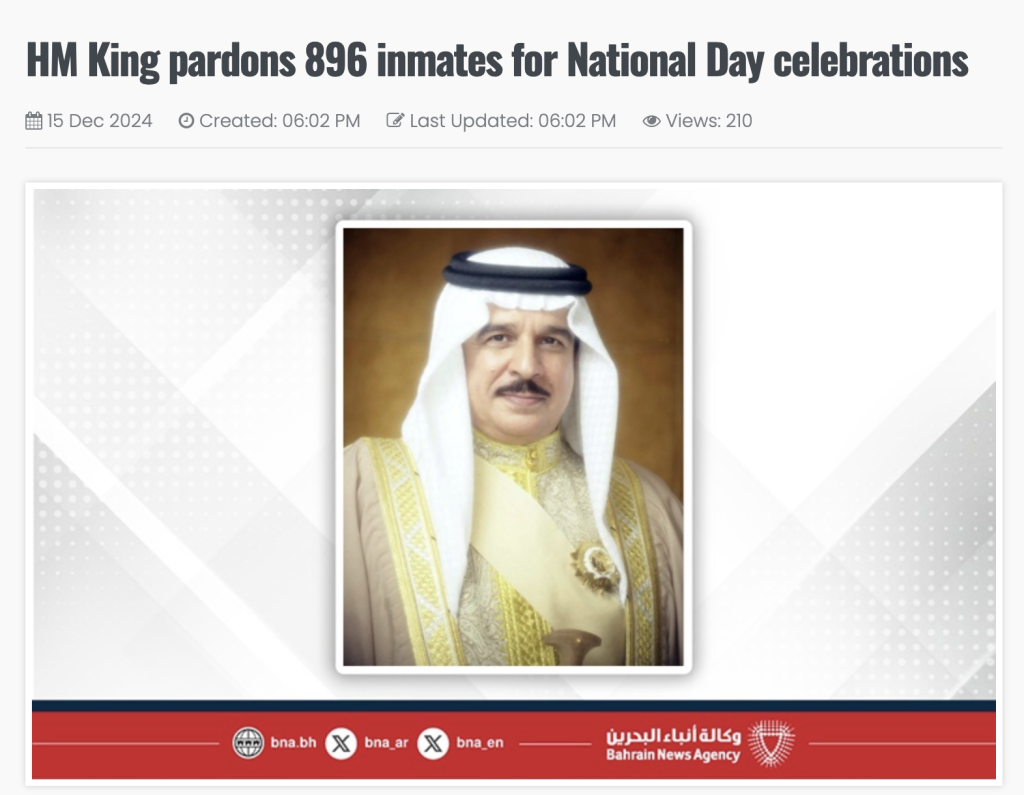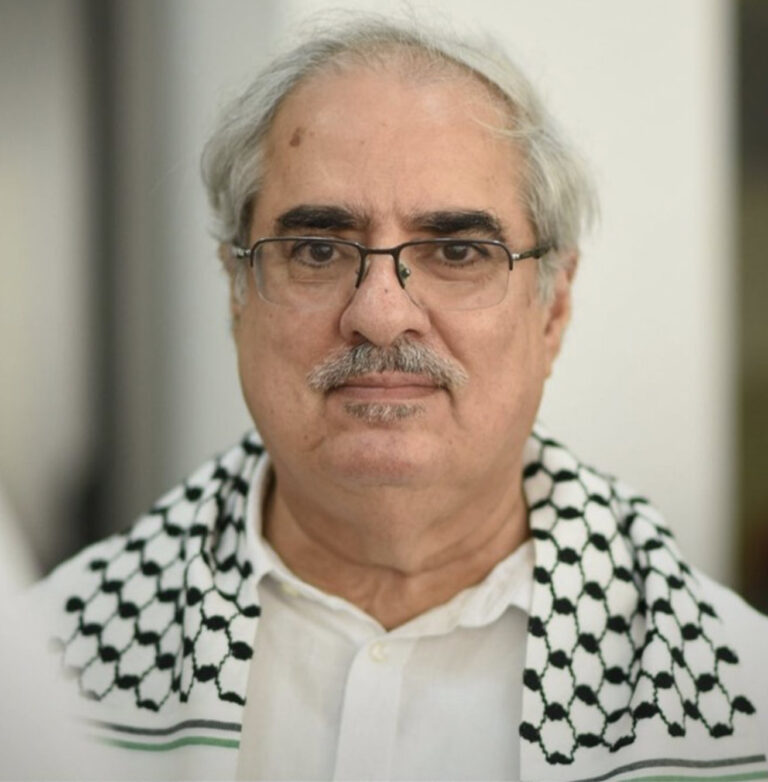London, 15 December 2024: Bahrain King Hamad bin Isa Al Khalifa issued a royal pardon for 896 inmates, which largely excluded political prisoners in Bahrain, the Bahrain Institute for Rights and Democracy (BIRD) stated today.
According to Bahrain News Agency, the official mouthpiece of the Bahraini Government:
“In celebration of the Kingdom of Bahrain’s National Day, the 25th anniversary of His Majesty King Hamad bin Isa Al Khalifa’s accession to the throne, and the accompanying national events, HM the King issued a decree granting a special pardon and releasing 896 inmates, including those convicted of various offences who have served part of their sentences, and individuals under alternative sentencing.”
However, no political prisoners from Jau Prison were released, and only those already serving alternative sentences were included in the pardon, according to information shared with BIRD.
There are currently some 340 political prisoners mainly held at the central Jau Prison, including 12 individuals sentenced to death—none of whom appear to be included in the pardon.
The royal pardon excluded leading opposition activists and human rights defenders, including Abduljalil Al-Singace, Abdulhadi Al-Khawaja, and Hassan Mushaima—all of whom remain arbitrarily imprisoned solely for their peaceful role in the 2011 uprising.
Sayed Ahmed Alwadaei, Advocacy Director of the Bahrain Institute for Rights and Democracy, commenting:
“When the King pardons nearly 900 prisoners, there is immense hope that the long-standing issue of political prisoners might finally end. But when you see that those convicted on political charges are excluded, it is most heartbreaking for Bahraini mothers whose dreams are shattered yet again.
The King must not underestimate this devastation and the nation’s outrage over the continued suffering of those who remain imprisoned only for expressing their views, and their grievances cannot be quelled until serious steps are taken and all political prisoners are released.”
Escalation in Jau Prison
The pardon comes just 10 days after the death of a political prisoner in Jau Prison, which sparked outrage as it marked the second death of a political prisoner in Jau Prison this year due to the authorities’ failure to provide emergency care and first-aid for prisoners.
See BIRD’s press release on the death of Hussain Aman: https://birdbh.org/2024/12/bahrain-tragic-death-of-political-prisoner-fuels-fears-of-unrest-in-the-prison/
This week, authorities reportedly used excessive force and collective punishment in Jau Prison to force political prisoners to end their strike, which has been ongoing for nearly eight months. Security forces reportedly used sound grenades, tear gas and pepper spray, directly targeting the faces of the prisoners.
Hundreds of prisoners are being subjected to harsh and inhumane treatment, including incommunicado detention with telephone calls suspended and prolonged confinement in their cells while handcuffed. Prisoners in Building 7, who are still on strike, reported that authorities have cut off water, electricity and food in response to the prisoners’ assuming control of the building.
Update on 16 December 2024: The wife of death row inmate Mohammed Ramadan posted on social media that prisoners overheard distress calls from Building 7 over the loudspeakers, with prisoners shouting, “We have been without food, water, electricity for 11 days, and our condition is deplorable! And no one is responding to us!”
In response, nine leading opposition figures held in Building 14 of Jau Prison, known as Bahrain’s “political symbols,” refused their meals today in solidarity with prisoners in Building 7.
Overview of royal pardons issued earlier this year
The pardon, which is the fourth mass pardon issued by the King this year, comes as a bitter disappointment for families who had been relentlessly advocating for the release of their loved ones.
Earlier this year, Bahrain’s King issued three royal pardons that led to the unconditional and immediate release of more than 2,500 prisoners, including an estimated 810 political prisoners, some of whom were serving alternative sentences:
-
- The first royal pardon for 1,584 convicted individuals, issued on 8 April 2024, included 650 political prisoners, 27 of whom were serving alternative sentences.
Background on Strike in Jau Prison ongoing since February 2024
On 25 March 2024, 32-year-old political prisoner Husain Khalil died after collapsing in Jau Prison. Eyewitnesses recounted that a paramedic arrived five to seven minutes after his collapse, appearing unequipped and untrained in emergency first aid. His death underscored the persistent issue of medical negligence in Bahrain’s prisons—a problem that has been described as a policy of “slow death.”
In the wake of this tragedy, approximately 1,000 political prisoners initiated a strike in Jau Prison, sparking protests across Bahrain. The prison administration responded to the strike with collective punishment, cutting off essential services such as air conditioning, drinking water, electricity, and medicine in Jau Prison.
On 15 August 2024, five UN experts called on Bahrain to restore rights in Jau prison in a press release expressing grave concerns about conditions in Bahrain’s Jau Prison, citing inadequate medical care, substandard food and water, overcrowding, extreme heat, and the harmful use of prolonged solitary confinement.
By late August to early September, negotiations and confidence-building measures between prisoners and authorities broke through, and tensions eased in Jau Prison, with fewer than 100 prisoners remaining on strike.
Hussain Aman’s death on 5 December, under strikingly similar circumstances, in which authorities failed to provide emergency first-aid for cardiac arrest, led to the reescalation of the strike.




